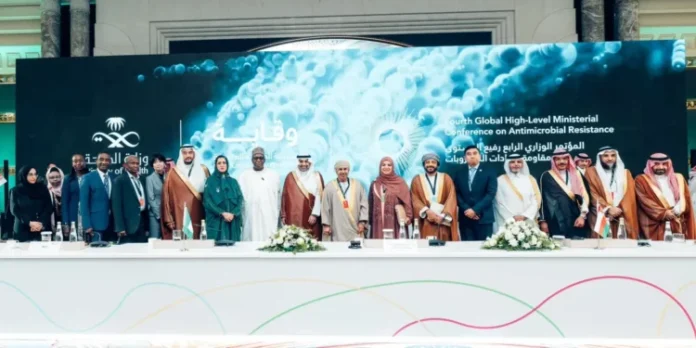Nigeria has been officially announced as the host for the 5th Global High-Level Ministerial Conference on Antimicrobial Resistance (AMR), set to take place in 2026. The announcement was made during the conclusion of the 4th edition of the conference, held in Jeddah, Saudi Arabia, from 15 to 16 November, under the leadership of Saudi Arabia’s Minister of Health, Fahad Al-Jalajel.
The Coordinating Minister of Health and Social Welfare, Muhammad Ali Pate, confirmed the success of the 4th bi-annual meeting and expressed Nigeria’s preparedness to host the next event. In a post on his X account, Pate thanked Saudi Arabia’s Minister of Health and the Saudi Ministry of Health for their exemplary leadership in addressing AMR, and pledged Nigeria’s readiness to continue the fight against antimicrobial resistance.
“We will learn and build upon your success for the 5th edition in 2026,” Pate wrote. “Counting on the Troika process for a smooth transition and the quadripartite, Nigeria is open to welcoming all member states in 2026.” He further highlighted the urgency of tackling AMR, describing it as a “silent but wicked problem” that affects lives and livelihoods globally. Pate stressed the importance of enhancing preventative measures, advancing access to effective antimicrobials, and promoting research and innovation to save lives.
The 4th AMR conference in Jeddah saw global health leaders, policymakers, and stakeholders coming together to confront the escalating AMR crisis. Delegates reaffirmed their commitment to strengthening National Action Plans and ensuring access to essential medicines. The conference resulted in the approval of the Jeddah Commitments, a set of actions designed to advance the global fight against AMR.
The Jeddah Commitments, with the theme “From Declaration to Implementation,” include significant actions to enhance governance, surveillance, stewardship, research and development, and public awareness through educational initiatives. These commitments build upon the Political Declaration on AMR adopted at the 79th United Nations General Assembly (UNGA79) in September 2024. Saudi Arabia’s Minister of Health expressed his belief that the Jeddah Commitments would drive forward the global AMR agenda with impactful actions, adding, “It’s time to act.”
In his speech, Al-Jalajel also confirmed Nigeria’s role as the host of the 5th Ministerial Conference, expressing confidence in the country’s capacity to carry the torch forward. To maintain momentum, he proposed the continued use of the Troika system, which will guide the implementation of AMR initiatives through 2025 and 2026, leading up to the next ministerial meeting.
Antimicrobial Resistance (AMR), as defined by the World Health Organization (WHO), occurs when bacteria, viruses, fungi, and parasites evolve and become resistant to the medicines designed to treat infections, making them harder to manage. This resistance increases the risk of disease spread, severe illness, and death.
During the 79th United Nations General Assembly, world leaders adopted ambitious targets to combat AMR, including reducing drug-resistant infections, promoting responsible antimicrobial use, strengthening global surveillance systems, and investing in research and innovation. They also committed to scaling up preventive measures and adopting a One Health approach, addressing AMR across human, animal, and environmental health.
These global commitments reflect the need for a coordinated, long-term approach to addressing AMR, with Nigeria now set to play a pivotal role in the next phase of this global effort.





